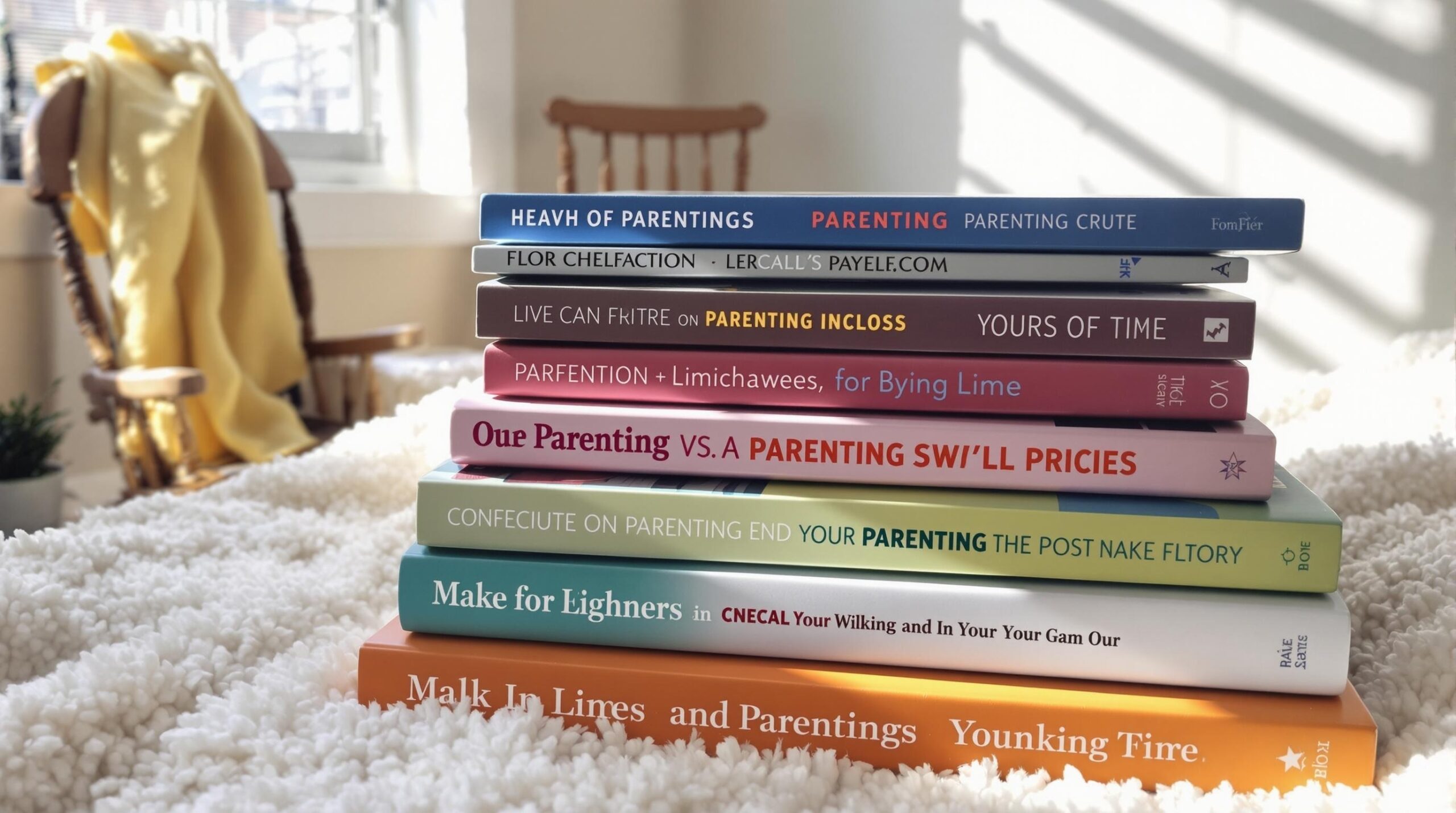Table of Contents Show
There may be products. Products are independently selected by our editors. We may earn an affiliate commission from the links with no charge to you, example: as Amazon Affiliate.
We’ve identified seven transformative parenting books that provide practical solutions for raising children. From “The Motherhood Journey” offering guidance for new mothers to “Raising Good Humans” teaching mindfulness-based approaches, these expert-recommended books address diverse parenting challenges. Whether you’re seeking faith-based wisdom, special needs support, or tools for raising grateful kids through illness, each book delivers evidence-backed strategies. Our extensive guide will help you navigate these valuable resources and find the perfect match for your family’s needs.
Key Takeaways
- Books focusing on mindfulness and stress reduction, like “Raising Good Humans,” help parents break reactive patterns and create calmer interactions.
- Evidence-based parenting literature that provides actionable techniques and practical strategies leads to better implementation and outcomes.
- Books offering both emotional support and concrete guidance, such as “The Motherhood Journey,” are most effective for new parents.
- Resources that incorporate interactive elements and family activities help strengthen bonds and make parenting concepts easier to apply.
- Selecting books that match your parenting philosophy and child’s developmental stage increases the likelihood of successful implementation.
The Motherhood Journey: Raising Grateful Kids (Birth to Age 2)
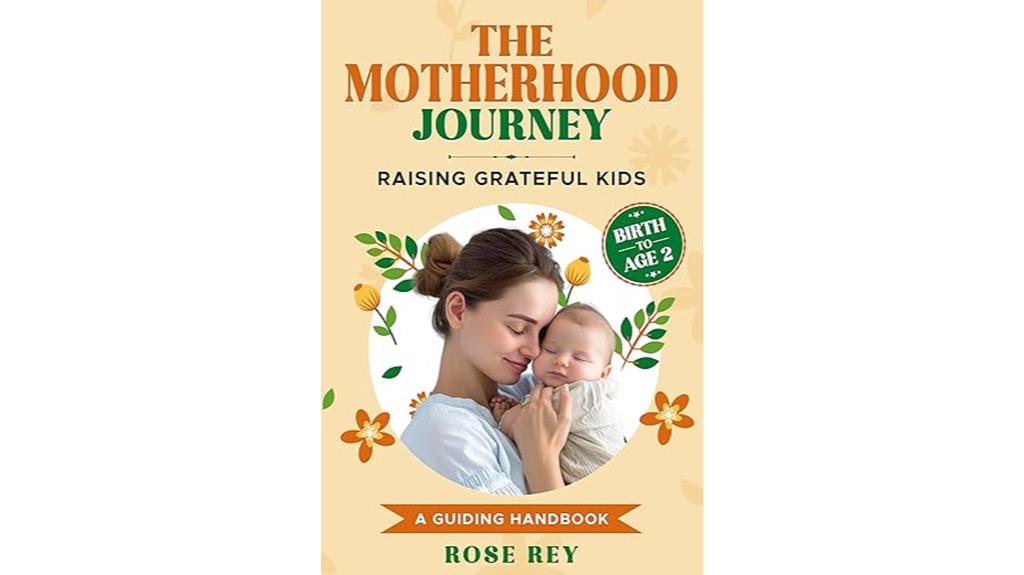
For new mothers seeking both practical guidance and emotional support during their child’s first two years, “The Motherhood Journey: Raising Grateful Kids” by Rose Rey offers a thorough roadmap through early parenthood.
We love how Rey combines personal stories with actionable advice on essential topics like stress management, child development, and self-care. The book’s strength lies in its dual focus: helping moms maintain their identity while providing strategies to create a nurturing environment for their little ones. Through compassionate writing and real-life examples, Rey addresses common challenges like sleepless nights and self-doubt, while celebrating milestones that make motherhood meaningful.
Best For: First-time mothers seeking both emotional support and practical guidance during their child’s first two years of life.
Pros:
- Combines personal anecdotes with actionable advice for a relatable and practical reading experience
- Comprehensive coverage of essential topics including stress management, child development, and self-care
- Written in a compassionate, supportive tone that acknowledges common parenting challenges
Cons:
- Limited age range focus (only birth to age 2) may reduce long-term usefulness
- Personal anecdotes may not resonate with all parenting experiences or situations
- May overwhelm some readers with the amount of information presented
Raising Good Humans: A Mindful Guide to Breaking the Cycle of Reactive Parenting
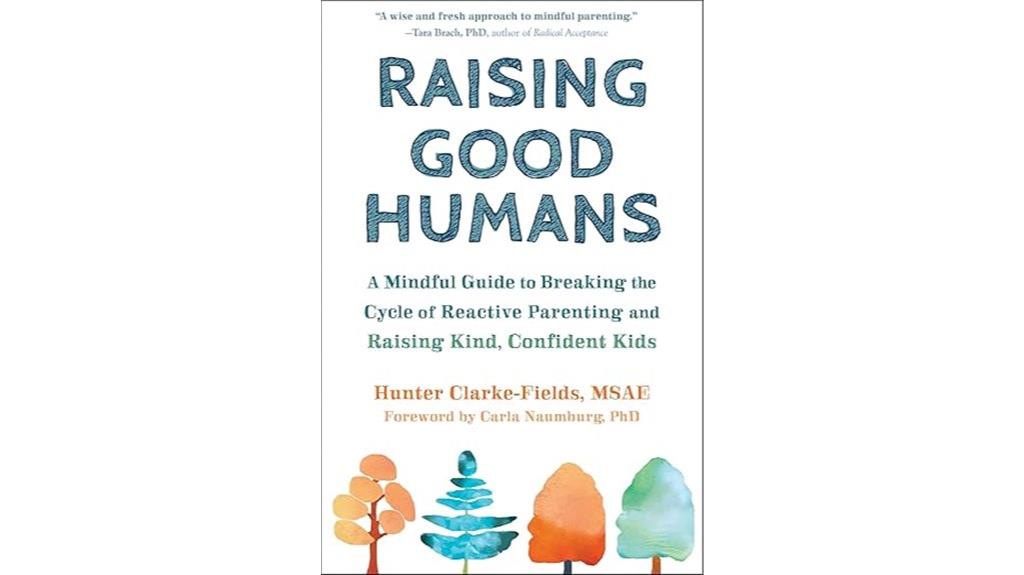
Parents seeking to break free from reactive parenting patterns will find invaluable wisdom in “Raising Good Humans: A Mindful Guide to Breaking the Cycle of Reactive Parenting.” This transformative guide combines mindfulness practices with practical strategies, helping readers understand their own behavioral triggers while developing healthier communication with their children.
We’ve found this book particularly beneficial for first-time parents maneuvering through uncertainty. Through daily meditation practices and self-reflection exercises, you’ll learn to manage stress and remain calm during challenging moments. The Buddhist-influenced teachings aren’t preachy but rather provide a framework for personal growth that directly impacts your relationship with your children.
Best For: First-time parents and those looking to break cycles of reactive parenting through mindfulness-based approaches.
Pros:
- Provides practical, daily strategies for managing parental stress and improving communication
- Combines mindfulness practices with actionable parenting techniques
- Helps parents understand and address their own triggers and past programming
Cons:
- Buddhist influences may not resonate with all readers
- Requires dedicated time and practice rather than being a quick-read solution
- Some concepts may need deeper study to fully implement
The Gratitude Prescription for Kids: A Guide Through Illness
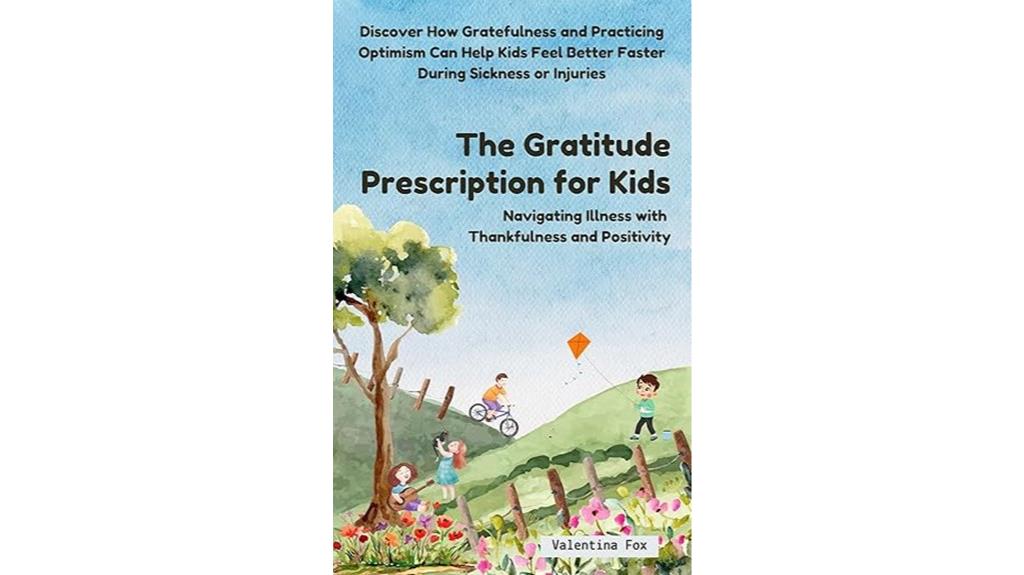
Children facing serious illnesses will find comfort and healing through “The Gratitude Prescription for Kids,” a transformative guide that combines heartfelt stories with practical activities.
We love how this book offers families concrete tools like gratitude journaling, vision boards, and affirmations that are easy to implement together. The step-by-step instructions make it simple for parents, teachers, and grandparents to guide children through these uplifting exercises.
The book’s emphasis on finding joy in everyday moments helps build resilience while strengthening family bonds. Parents report that practicing gratitude as a family has created deeper connections and a more positive mindset during challenging times.
Best For: Children dealing with serious illnesses and their families seeking practical tools to maintain positivity and build resilience through gratitude practices.
Pros:
- Provides concrete, easy-to-follow activities like gratitude journaling and vision boards
- Strengthens family bonds through shared activities and experiences
- Combines inspirational stories with practical exercises for emotional healing
Cons:
- May be emotionally challenging for some families to work through during difficult times
- Requires consistent family participation to achieve maximum benefit
- Content might need adaptation for very young children or those with severe conditions
Becoming a Seriously Happy Special Needs Mom: 21 Steps
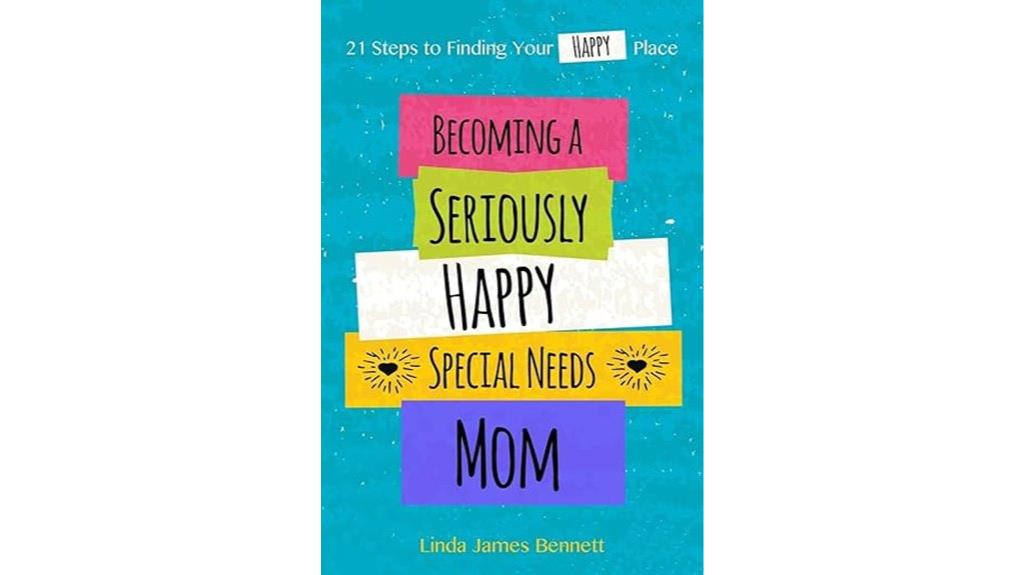
Mothers raising children with special needs will find solace and practical guidance in Linda Bennett’s “Becoming a Seriously Happy Special Needs Mom: 21 Steps.” This compassionate guide transforms challenging experiences into manageable steps, offering both emotional support and actionable strategies.
We love how Bennett emphasizes self-care while validating the complex emotions parents face during assessments and IEP meetings. Her approach creates a sense of community, making readers feel less alone in their journey. Through personal insights and practical advice, she helps parents navigate educational systems, manage stress, and embrace their child’s unique development path – all while remembering that taking care of themselves is essential to being the best parent possible.
Best For: Parents and caregivers of children with special needs who are seeking emotional support, practical guidance, and strategies for maintaining their own well-being while navigating the challenges of special needs parenting.
Pros:
- Provides both emotional validation and practical, actionable steps for managing daily challenges
- Creates a sense of community through shared experiences and relatable content
- Emphasizes the importance of self-care and personal growth while parenting
Cons:
- Focus on mothers may limit relevance for fathers or other caregivers
- May not address specific challenges of all types of special needs conditions
- Some strategies might need adaptation for different cultural or socioeconomic contexts
Give Them Grace: Gospel-Centered Parenting Guide
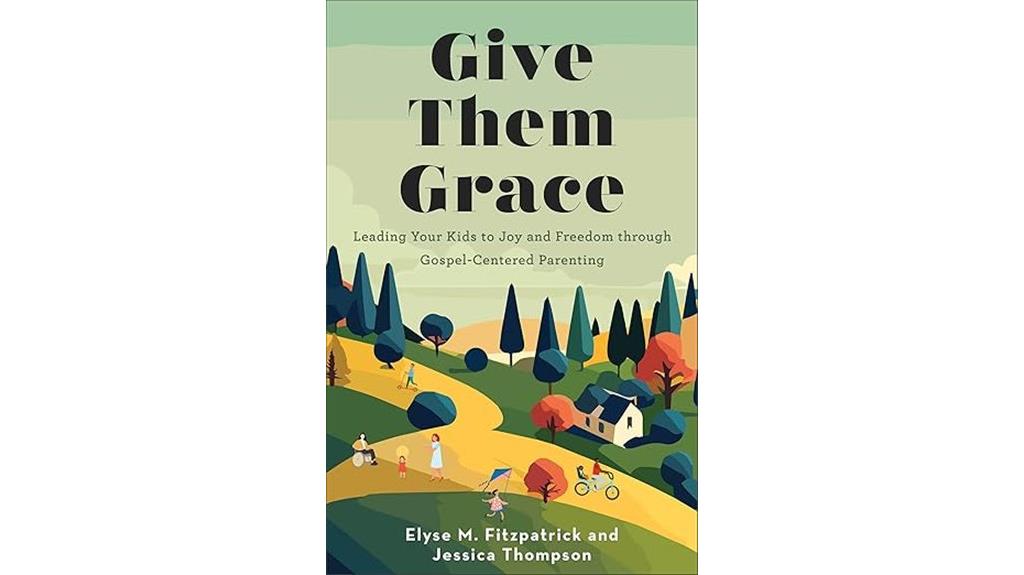
Looking for a grace-filled approach to raising children? “Give Them Grace: Gospel-Centered Parenting Guide” offers a revitalizing perspective that places identity in Christ at the forefront of parenting techniques.
We’ve found this book particularly valuable for parents who didn’t grow up in grace-centered environments. Through relatable examples and practical applications, it helps us navigate daily parenting challenges while consistently pointing back to Christ. The emphasis on understanding grace transforms how we interact with our children, moving beyond mere behavior management to spiritual nurturing. It’s a foundational resource that reminds us of our divine calling as parents while providing the spiritual guidance needed for this journey.
Best For: Parents seeking a faith-based approach to child-rearing who want to move beyond behavioral management to grace-centered parenting rooted in Christian principles.
Pros:
- Provides practical, relatable examples that help parents apply grace-centered concepts
- Focuses on spiritual development rather than just behavioral modification
- Particularly helpful for those who didn’t experience grace-centered parenting themselves
Cons:
- May not resonate with parents seeking secular parenting advice
- Could be challenging to implement without a strong foundation in Christian theology
- Some concepts may require significant mindset shifts for traditional discipline-focused parents
The Danish Way of Parenting: Raising Confident, Capable Kids
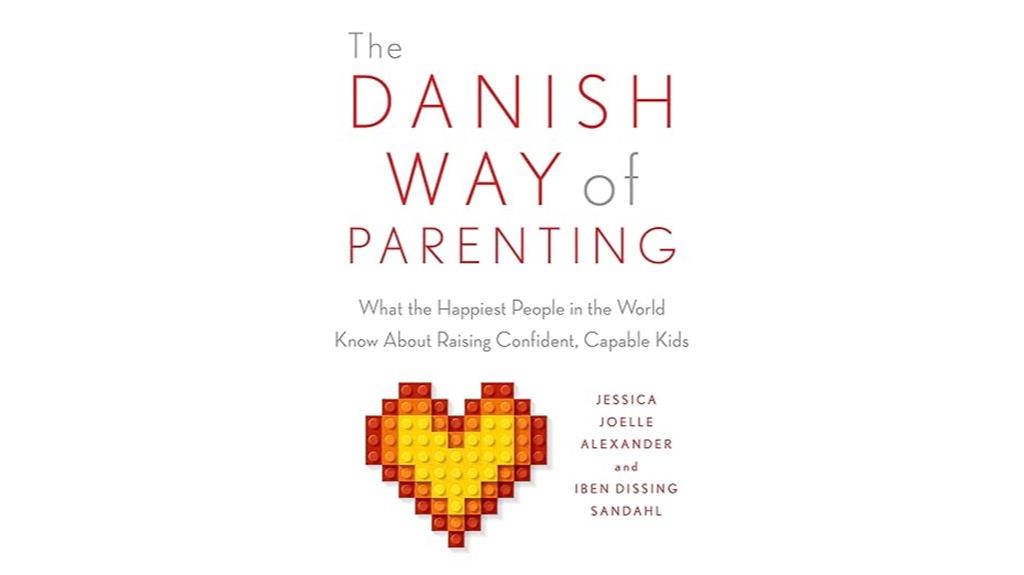
The Danish Way of Parenting offers a rejuvenating approach for parents seeking to raise resilient, emotionally intelligent children through gentle, mindful methods. We love how this guide integrates Danish cultural wisdom into practical, actionable steps that any parent can implement immediately.
While some readers note the book’s limited empirical evidence, we’ve found its principles highly effective in fostering empathy, confidence, and strong family bonds. The book’s accessibility makes it easy to revisit during different developmental stages, and parents report significant improvements in communication and overall family happiness. Whether you’re new to parenting or seasoned, you’ll discover valuable insights for nurturing capable, well-adjusted kids.
Best For: Parents seeking gentle, mindful approaches to raise emotionally intelligent and confident children while incorporating Danish cultural wisdom into their parenting style.
Pros:
- Offers practical, immediately implementable parenting techniques
- Emphasizes empathy, community, and confidence-building methods
- Accessible writing style makes concepts easy to understand and revisit
Cons:
- Limited empirical evidence supporting claims
- Relies heavily on anecdotal evidence
- May lack depth in addressing specific social challenges in different cultural contexts
Smart Parenting for Smart Kids: Nurturing Your Childs True Potential
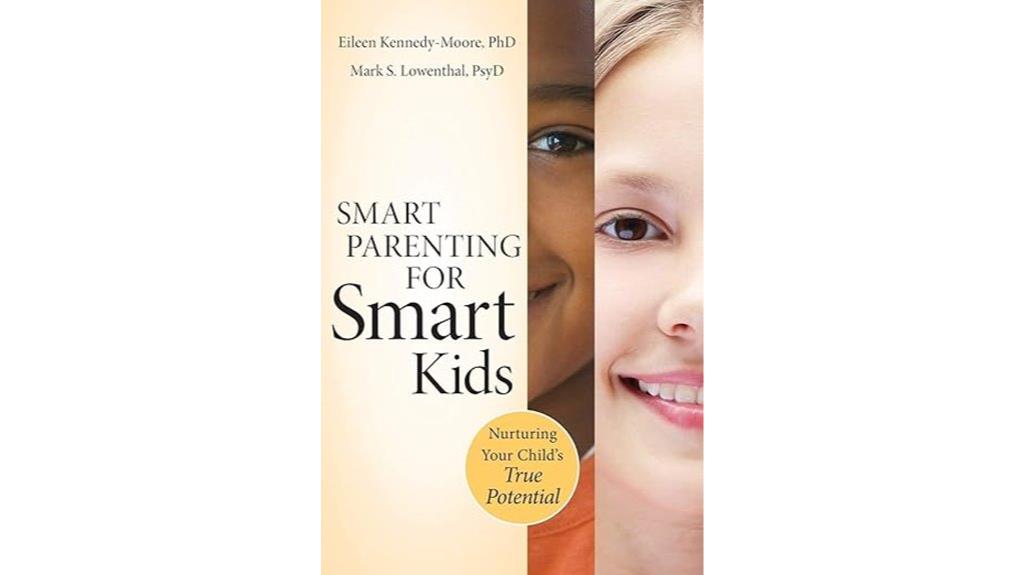
Parents seeking guidance for nurturing their children’s potential will find invaluable wisdom in “Smart Parenting for Smart Kids.” While many parenting books focus solely on academic achievement, this all-encompassing guide addresses the intellectual, emotional, and social development that smart children need to thrive.
We love how this book offers practical solutions for real-life challenges, helping us foster independence and better communication with our kids. It teaches us to recognize our children’s unique strengths while providing strategies that promote listening without argument. Whether you’re raising traditionally “gifted” kids or not, you’ll discover effective ways to support your child’s growth through compassionate, understanding approaches that work.
Best For: Parents seeking practical guidance on nurturing their children’s intellectual, emotional, and social development while fostering better communication and understanding.
Pros:
- Provides actionable, real-world solutions for common parenting challenges
- Focuses on comprehensive child development beyond just academic achievement
- Helps improve parent-child communication and relationship dynamics
Cons:
- May contain some redundant information for experienced parents
- Could benefit from more specific examples for different age groups
- Some strategies may need to be adapted for children with special needs
Factors to Consider When Choosing Parenting Books for Navigating the Joys and Challenges of Raising Kids
When we’re searching for the right parenting books to guide us through raising our children, we need to take into account key factors like our child’s developmental stage and whether the author’s expertise aligns with current research-based approaches. We’ll want to make sure the book’s parenting philosophy matches our family’s values while offering concrete, actionable advice we can implement daily. It’s crucial to look for books that balance theoretical knowledge with practical strategies, helping us navigate both everyday situations and significant developmental milestones.
Your Child’s Age Range
Selecting parenting books that match your child’s developmental stage guarantees you’ll get advice that’s both timely and relevant. We recommend focusing on books that specifically address your child’s age range, as the challenges and milestones vary greatly throughout childhood.
For parents of infants and toddlers up to age 2, we suggest looking for books that cover attachment, sleep schedules, and early emotional development. These foundational years require specific guidance that won’t apply to older children. As your child enters preschool and school age, you’ll want to shift to books discussing social skills, behavior management, and academic support. By choosing age-appropriate parenting literature, we’re better equipped to understand and respond to our children’s needs, making the parenting journey more rewarding and effective.
Parenting Style Compatibility
Beyond matching your child’s age, finding parenting books that align with your values and approaches makes a significant difference in their usefulness. We’ve found that parents get the most value when they choose authors whose philosophies resonate with their own parenting style.
If you’re drawn to gentle parenting, look for books emphasizing emotional connection and empathy. On the other hand, if you prefer structured approaches, seek resources offering clear guidelines and behavioral strategies. When the advice matches your comfort level, you’re more likely to implement it consistently and effectively.
Consider your specific challenges too – whether it’s managing difficult behaviors or encouraging independence. The key is finding books that address these issues while staying true to your parenting framework, making the guidance both practical and compatible with your family’s dynamics.
Author’s Background Expertise
The credibility of parenting advice hinges heavily on the author’s background and expertise. When we’re selecting parenting books, we should look for authors with strong foundations in child psychology, education, or professional counseling. These qualifications guarantee their insights are grounded in research and proven methodologies.
We’ll want to evaluate authors who combine academic knowledge with real-world experience. Those who’ve worked with families through therapy, social work, or community organizations often provide more nuanced, practical advice. Parents who write from personal experience while backing their insights with professional credentials offer an especially valuable perspective. Additionally, we should check if the author has previous publications or contributions to respected parenting resources, as this illustrates sustained engagement with family-centered topics.
Practical Advice Focus
Practical parenting advice shines through books that offer concrete strategies rather than vague theories. When we’re looking for parenting guidance, we want resources that provide step-by-step solutions we can implement right away with our children.
We recommend choosing books that include interactive elements like family activities, journaling prompts, and mindfulness exercises. These hands-on tools help us put advice into practice while strengthening family bonds. The most effective parenting books combine real-life stories with actionable tips, making complex concepts easier to understand and apply.
Look for books that address both children’s developmental stages and parents’ emotional well-being. They should outline age-appropriate activities while emphasizing self-care strategies for parents, as our own mental health directly impacts our parenting effectiveness.
Value-Based Teaching Approaches
Core values serve as the foundation for effective parenting approaches in many top-rated books. We recommend looking for guides that emphasize teaching gratitude, empathy, and resilience, as these qualities greatly impact a child’s social and emotional growth. When selecting parenting resources, we’ll want books that offer practical ways to incorporate mindfulness and self-reflection into daily routines, helping our children better understand their emotions and reactions.
Books that focus on positive reinforcement strategies can help us recognize and nurture our children’s unique talents while building their self-confidence. We should also prioritize resources that provide guidance on family engagement activities, as these strengthen bonds and reinforce shared values. The best parenting books will show us how to create supportive environments where our children can develop strong character and emotional intelligence.
Cultural Context Relevance
When selecting parenting books, considering cultural context relevance helps us make informed choices that align with our family’s values and traditions. We need resources that reflect diverse parenting philosophies and child-rearing practices across different cultures, as these insights can strengthen our approach to raising resilient, empathetic children.
We’ll find that the most effective parenting strategies often work best when they match our cultural background and societal norms. Books that acknowledge these cultural differences become valuable tools for understanding our children’s unique needs. They also create opportunities for meaningful conversations about heritage and identity. By choosing culturally relevant parenting books, we’re better equipped to foster our children’s emotional and social development while maintaining strong connections to our family’s cultural roots.
Special Needs Considerations
Finding parenting books that address special needs requires careful consideration of our unique family circumstances and challenges. We recommend looking for resources written by authors with firsthand experience raising children with disabilities, as their personal insights often prove invaluable. These books should emphasize understanding your child’s emotional and developmental needs while providing practical guidance for maneuvering educational systems and therapy options.
We’ve found that the most helpful resources also address self-care strategies for parents, acknowledging the emotional and physical demands of raising a child with special needs. Additionally, look for books that highlight the importance of community building – connecting with other parents who share similar experiences can provide essential support throughout your journey. The best guides combine empathy with actionable advice for assessment processes and daily challenges.
Evidence-Based Research Support
Selecting reliable parenting books requires a careful look at their research foundations. We recommend choosing books that cite empirical studies and provide evidence for their recommended strategies. When authors reference psychological research and include citations, we can verify their claims and better understand the principles behind their advice.
Studies show that parents who use evidence-based resources achieve better outcomes, including improved child academic performance and emotional well-being. We’ve found that books grounded in scientific research help build parenting confidence and promote consistent application of effective techniques. Look for works that draw from reputable sources like the American Psychological Association and peer-reviewed journals. The best parenting guides will transparently share their research backing, allowing us to make informed decisions about which strategies to implement in our families.
Conclusion
We’ve all been there – standing in the parenting section, overwhelmed by choices, when the perfect book seems to catch our eye. Whether we’re tackling toddler tantrums or teen drama, these seven guides offer practical wisdom for every stage. Just as no two children are alike, we’ll find different approaches resonate with our unique parenting journey. Let’s embrace the adventure with these trusted companions by our side.
